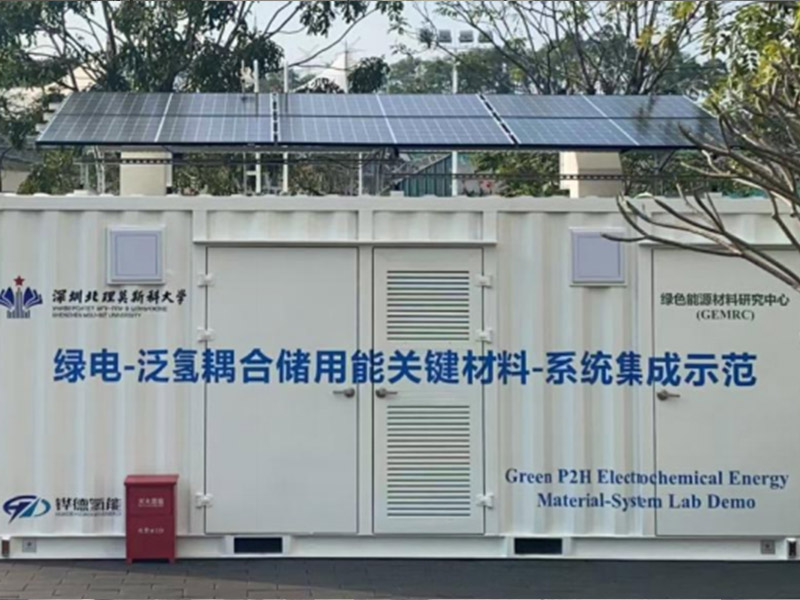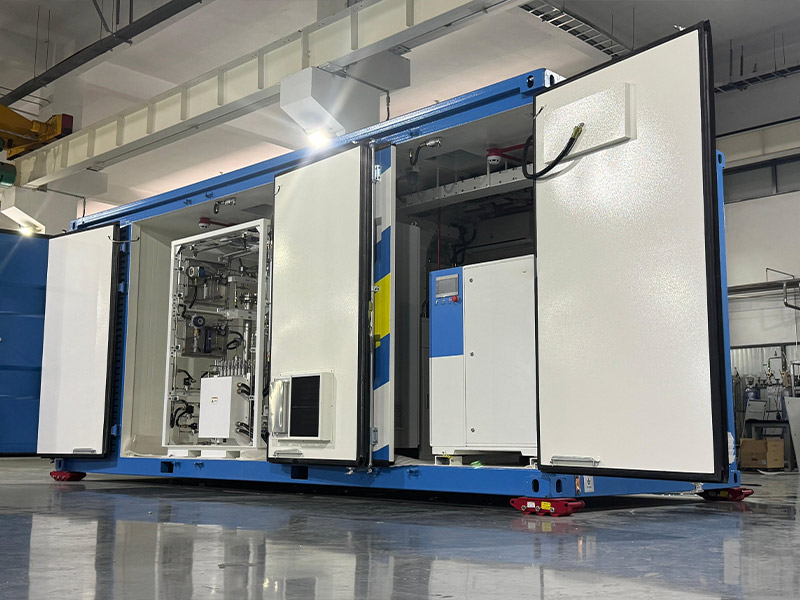In an era of rising energy costs and unreliable power grids, more homeowners and businesses are seeking true energy independence. Solar hydrogen technology offers a revolutionary way to break free from fossil fuels while maintaining reliable, 24/7 power. This guide explains how you can harness this cutting-edge solution.
Keypoints
l Solves solar’s intermittency by storing excess energy as hydrogen, ensuring power during nighttime or bad weather.
l Enables true off-grid living with seasonal storage, unlike batteries that degrade and offer short-term capacity.
l Scalable for any need, from small homes to large communities, with modular solar panels and hydrogen tanks.
l Zero-emission and sustainable, producing only water vapor when used—no greenhouse gases or battery waste.
l Future-ready technology, aligning with global hydrogen infrastructure growth for transport, heating, and industry.
While solar panels are excellent for daytime power, they face two critical limitations:
l Intermittency Problem - No generation at night or during storms
l Battery Limitations - Even the best lithium batteries degrade over time and provide limited storage capacity
Solar hydrogen solves both challenges by converting excess solar energy into storable hydrogen fuel.
A solar hydrogen system transforms sunlight into clean, storable energy through a seamless process. By combining solar panels with water-splitting technology, it creates a renewable energy loop that produces zero emissions. Whether used for homes, businesses, or industrial applications, understanding how each step works—from capturing solar power to storing and utilizing hydrogen—reveals why this technology is gaining momentum in the transition to a sustainable energy future.
Photovoltaic panels generate electricity during daylight hours
Excess power beyond immediate needs is diverted to an electrolyzer
Electrolyzer splits water molecules into hydrogen and oxygen
1 kg of hydrogen stores about 33 kWh of energy (equivalent to 3 gallons of gasoline)
Hydrogen is compressed and stored in secure tanks
When needed, fuel cells convert hydrogen back to electricity
Only byproduct is pure water - completely emission-free
Unlike traditional solar systems that rely heavily on battery storage or the ability to sell excess electricity back to the grid, solar hydrogen enables users to store renewable energy for extended periods and deploy it when needed most. This capability is a cornerstone for those seeking long-term, stable, and sustainable energy independence. Let’s dive deeper into how this works and why it’s a game-changer:
One of the biggest challenges with renewable energy is intermittency—the sun doesn’t always shine, and the wind doesn’t always blow. Batteries, while helpful, can typically only store electricity for short durations (from hours to a few days), and they degrade over time.
Hydrogen storage, in contrast, allows energy to be stored for weeks or even months without significant losses. This makes it ideal for seasonal energy balancing, where energy captured during high-production periods like sunny summers can be used in colder, darker months.
Key benefits include:
Storing excess solar energy during peak generation hours or long summer days when solar panels produce more than needed.
Supplying energy on demand during cloudy weather, night-time, or winter seasons.
Reducing reliance on batteries, which have shorter lifespans and can involve environmentally challenging materials like lithium and cobalt.
Maintaining uninterrupted power supply without depending on diesel generators or the main grid.
Hydrogen’s ability to decouple energy production from consumption timeframes opens the door to true energy resilience.
Solar hydrogen systems are highly adaptable, meaning they can be customized to suit a wide range of user profiles and energy demands.
Whether you're a homeowner, a remote farm operator, a business owner, or managing an eco-friendly community, there’s a scalable model that fits:
l Small-scale setups: A combination of rooftop solar panels, a home-sized electrolyzer, and hydrogen storage tanks can support the energy needs of a single-family household.
l Medium-scale applications: Agricultural operations, rural clinics, or apartment blocks can deploy slightly larger systems to power multiple users or essential services.
l Large-scale infrastructure: Industrial sites and remote communities can create their own hydrogen microgrids, significantly reducing or even eliminating reliance on centralized power infrastructure.
This scalability not only supports diverse needs but also ensures that as your energy requirements grow, your system can evolve with them.
For those who dream of disconnecting from the traditional power grid entirely, solar hydrogen offers a realistic and sustainable path forward.
Traditional off-grid systems require careful energy management and often involve backup diesel generators—hardly a clean or convenient solution. With hydrogen, excess solar power can be converted and stored for use at any time, creating a closed-loop, self-sufficient energy cycle.
Advantages of solar hydrogen in off-grid living:
l No more energy rationing: Use energy confidently, even in poor weather or at night.
l Ideal for remote locations: Places where grid connections are unavailable or prohibitively expensive can become energy self-reliant.
l Disaster preparedness: In areas prone to natural disasters or grid failures, solar hydrogen systems can provide reliable backup power for days or weeks without refueling.
This level of independence is especially valuable in rural areas, island communities, or mobile applications like off-grid cabins or boats.
When solar power is used to generate hydrogen, the process is completely emission-free. Unlike fossil fuels or even some batteries that involve heavy resource extraction and disposal challenges, solar hydrogen is one of the cleanest solutions available.
Environmental benefits include:
Zero greenhouse gas emissions when the hydrogen is used—just water vapor is released.
Avoidance of battery-related waste, which can include heavy metals and chemical leakage over time.
Renewable input, renewable output: Both the energy source (sunlight) and the end fuel (hydrogen) are renewable, making this a fully circular solution.
Minimal land impact compared to other energy storage systems that require large-scale facilities.
As the world moves toward net-zero emissions goals, adopting solar hydrogen aligns perfectly with long-term sustainability targets.
The transition toward a hydrogen economy is well underway, with governments and industries investing billions into hydrogen-ready infrastructure. By integrating solar hydrogen into your energy setup now, you’re not just gaining independence—you’re preparing for a future where hydrogen will play a central role in transport, heating, and industry.
Future-forward features include:
Compatibility with hydrogen appliances such as hydrogen boilers, cooking devices, and backup generators.
Fueling hydrogen-powered vehicles like fuel cell electric cars, which are becoming more available globally.
Potential financial incentives, including government subsidies, tax rebates, and green energy credits for hydrogen energy users.
Being an early adopter not only future-proofs your property or facility but also positions you for advantages as clean energy policies evolve.
While solar hydrogen is promising, it's important to be aware of current limitations:
High Initial Costs: Electrolyzers and hydrogen storage systems are still relatively expensive.
Efficiency Loss: Converting electricity to hydrogen and back results in energy loss.
Technology Maturity: Some components (like residential-scale fuel cells) are still in early stages.
However, rapid advancements and decreasing costs are making solar hydrogen increasingly accessible. With global investments and policy support on the rise, it’s expected to become a mainstream energy solution in the near future.
Solar hydrogen represents a powerful path to achieving true energy independence—especially when paired with thoughtful energy planning and efficient design. By harvesting the sun's energy and storing it in the form of hydrogen, homeowners and communities can create a self-reliant, eco-friendly energy system that provides reliable power year-round.
Whether you're looking to live off the grid, cut your energy bills, or simply take control of your power supply, solar hydrogen is a technology worth considering.
Excess solar energy converts to hydrogen via electrolysis, storing it for use at night or during cloudy days—eliminating reliance on the grid.
Yes, for long-term needs. Hydrogen stores energy for months without degradation, while batteries last only days and lose capacity over time.
Absolutely! With enough solar panels and hydrogen storage, homes can go fully off-grid, even in winter.
Yes. Modern systems use secure tanks with leak detectors and ventilation, similar to propane safety standards.
High upfront costs for electrolyzers and storage, but prices are dropping as technology advances.
Yes—hydrogen fuels cars, generators, and even home heating systems, offering a fossil-free alternative.


